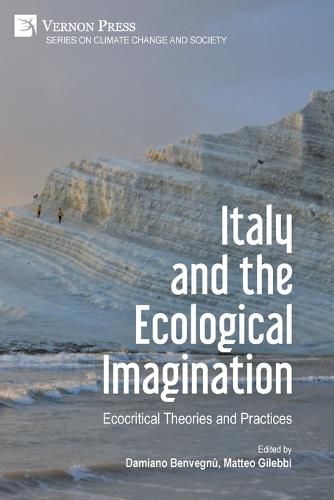Readings Newsletter
Become a Readings Member to make your shopping experience even easier.
Sign in or sign up for free!
You’re not far away from qualifying for FREE standard shipping within Australia
You’ve qualified for FREE standard shipping within Australia
The cart is loading…






This title is printed to order. This book may have been self-published. If so, we cannot guarantee the quality of the content. In the main most books will have gone through the editing process however some may not. We therefore suggest that you be aware of this before ordering this book. If in doubt check either the author or publisher’s details as we are unable to accept any returns unless they are faulty. Please contact us if you have any questions.
What can Italy teach us about our relationships with the nonhuman world in the current socio-environmental crisis? 'Italy and the Ecological Imagination: Ecocritical Theories and Practices' focuses on how Italian writers, activists, visual artists, and philosophers engage with real and fictional environments and how their engagements reflect, critique, and animate the approach that Italian culture has had toward the physical environment and its ecology since late antiquity. Through a comparative and interdisciplinary approach, the essays collected in this volume explore topics including climate change, environmental justice, animal ethics, and socio-environmental degradation to provide a cogent analysis of how Italian ecological narratives fit within the current transnational debate occurring in the Environmental Humanities.
The aim of 'Italy and the Ecological Imagination' is thus to explore non-anthropocentric modes of thinking and interacting with the nonhuman world. The goal is to provide accounts of how Italian historical records have potentially shaped our environmental imagination and how contemporary Italian authors are developing approaches beyond humanism in order to raise questions about the role of humans in a possible (or potentially) post-natural world. Ultimately, the volume will offer a critical map of Italian contributions to our contemporary investigation of the relationships between human and nonhuman habitats and communities.
$9.00 standard shipping within Australia
FREE standard shipping within Australia for orders over $100.00
Express & International shipping calculated at checkout
This title is printed to order. This book may have been self-published. If so, we cannot guarantee the quality of the content. In the main most books will have gone through the editing process however some may not. We therefore suggest that you be aware of this before ordering this book. If in doubt check either the author or publisher’s details as we are unable to accept any returns unless they are faulty. Please contact us if you have any questions.
What can Italy teach us about our relationships with the nonhuman world in the current socio-environmental crisis? 'Italy and the Ecological Imagination: Ecocritical Theories and Practices' focuses on how Italian writers, activists, visual artists, and philosophers engage with real and fictional environments and how their engagements reflect, critique, and animate the approach that Italian culture has had toward the physical environment and its ecology since late antiquity. Through a comparative and interdisciplinary approach, the essays collected in this volume explore topics including climate change, environmental justice, animal ethics, and socio-environmental degradation to provide a cogent analysis of how Italian ecological narratives fit within the current transnational debate occurring in the Environmental Humanities.
The aim of 'Italy and the Ecological Imagination' is thus to explore non-anthropocentric modes of thinking and interacting with the nonhuman world. The goal is to provide accounts of how Italian historical records have potentially shaped our environmental imagination and how contemporary Italian authors are developing approaches beyond humanism in order to raise questions about the role of humans in a possible (or potentially) post-natural world. Ultimately, the volume will offer a critical map of Italian contributions to our contemporary investigation of the relationships between human and nonhuman habitats and communities.